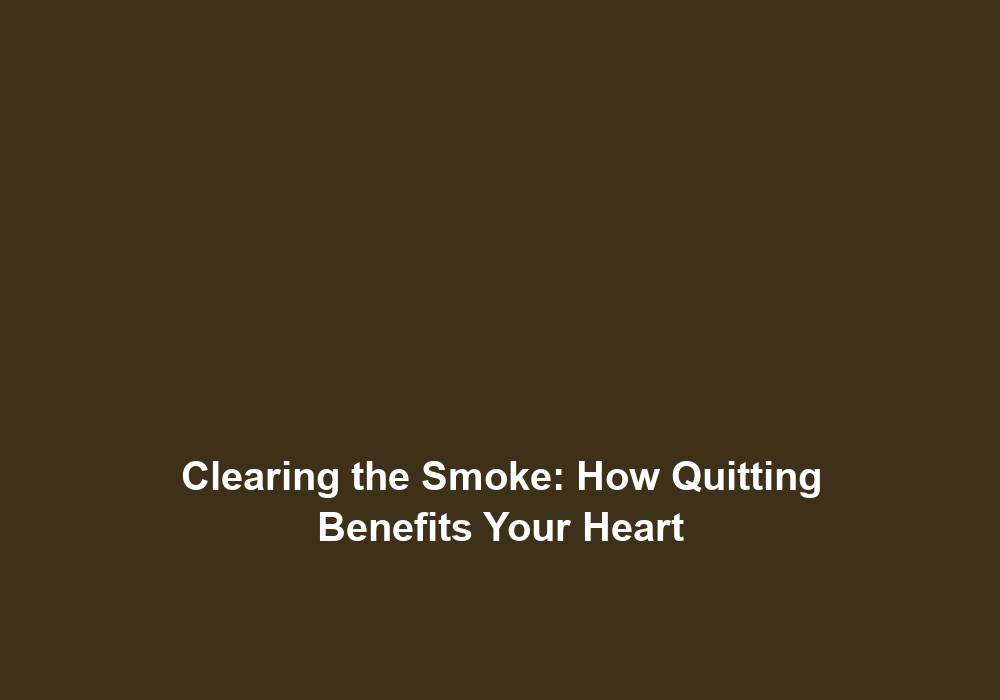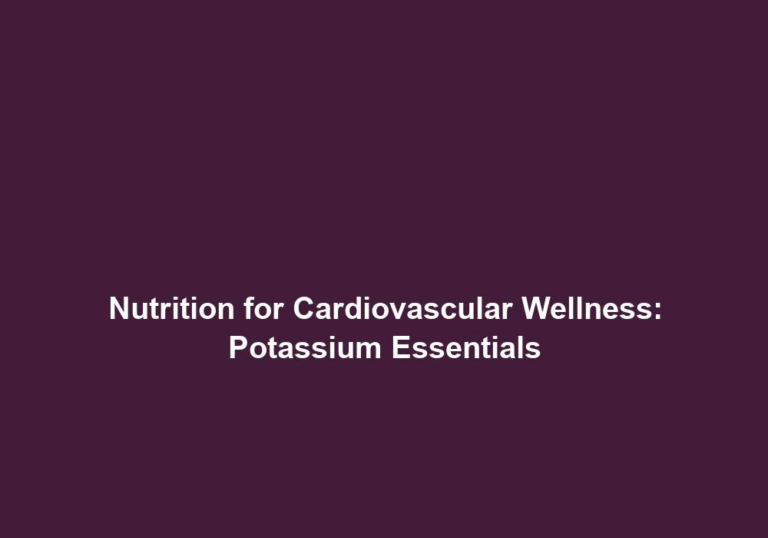Clearing the Smoke: How Quitting Benefits Your Heart
Smoking is a prevalent habit worldwide, with detrimental effects not only on the respiratory system but also on overall health. One of the most significant organs affected by smoking is the heart. In this article, we will explore the numerous ways quitting smoking can benefit your heart health.
The Link Between Smoking and Heart Disease
Smoking is a major risk factor for heart disease, which includes conditions such as coronary artery disease, heart attacks, and stroke. The harmful chemicals present in cigarettes can damage the heart and blood vessels, leading to a range of cardiovascular problems.
- Increased Risk of Coronary Artery Disease: Smoking increases the buildup of plaque inside the arteries, narrowing them and restricting the flow of oxygen-rich blood to the heart. This condition, known as coronary artery disease, can result in chest pain, heart attacks, and even heart failure.
Smoking not only damages the heart but also affects the entire cardiovascular system. The chemicals in cigarettes, such as nicotine and carbon monoxide, contribute to the development of coronary artery disease. This disease occurs when the arteries that supply the heart with blood become narrow and hardened due to the buildup of plaque. As a result, the heart does not receive enough oxygen-rich blood, leading to chest pain, heart attacks, and potentially heart failure.
- Heightened Blood Pressure: Smoking causes an immediate and temporary rise in blood pressure. Over time, this continuous increase can damage the blood vessels and strain the heart, increasing the risk of heart disease.
Apart from the risk of coronary artery disease, smoking also causes a rise in blood pressure. When a person smokes, the nicotine in the cigarettes stimulates the release of adrenaline, leading to an immediate increase in blood pressure. This temporary rise in blood pressure can become chronic if smoking continues, damaging the blood vessels and putting strain on the heart. Over time, this can lead to the development of high blood pressure, a significant risk factor for heart disease.
- Promotes Inflammation and Blood Clotting: Smoking triggers inflammation in the body and promotes the formation of blood clots. Both these factors contribute to the development of atherosclerosis, a condition characterized by the hardening and narrowing of arteries.
In addition to the increased risk of coronary artery disease and heightened blood pressure, smoking also promotes inflammation and blood clotting. When a person smokes, the chemicals in cigarettes cause irritation and damage to the lining of the blood vessels, leading to inflammation. This inflammation, along with the chemical reactions triggered by smoking, promotes the formation of blood clots. These blood clots can partially or completely block the blood flow through the arteries, leading to atherosclerosis. Atherosclerosis is a condition characterized by the buildup of plaque inside the arteries, which can restrict blood flow and increase the risk of heart disease.
Benefits of Quitting Smoking for the Heart
Quitting smoking is undoubtedly challenging, but the rewards for your heart health are immense. Here are some notable benefits of kicking the habit:
- Reduced Risk of Heart Disease: Within just a few months of quitting smoking, your risk of heart disease begins to decline. Over time, the risk decreases even further, eventually reaching that of a non-smoker.
Quitting smoking is the single most important step you can take to reduce your risk of heart disease. Studies have shown that within a few months of quitting, your risk of heart disease starts to decline. As time goes on and you remain smoke-free, the risk continues to decrease until it eventually reaches that of a non-smoker. This means that quitting smoking can significantly improve your heart health and potentially save your life.
- Improved Blood Pressure: Quitting smoking helps lower blood pressure levels, reducing strain on the heart and blood vessels. As a result, the risk of heart disease and related complications diminishes.
When you quit smoking, your blood pressure levels start to improve. The immediate rise in blood pressure caused by smoking subsides, and over time, your blood pressure decreases to healthier levels. This reduction in blood pressure puts less strain on your heart and blood vessels, reducing the risk of heart disease and related complications. By quitting smoking, you are taking a crucial step towards improving your heart health and overall well-being.
- Decreased Inflammation: When you stop smoking, the inflammation in your body starts to subside. This reduces the damage to the arteries and lowers the risk of atherosclerosis.
One of the significant benefits of quitting smoking is the reduction in inflammation throughout your body. When you stop smoking, the chemicals that cause irritation and damage to the blood vessels are no longer present. As a result, the inflammation in your body begins to subside, reducing the damage to the arteries. This decrease in inflammation lowers the risk of developing atherosclerosis, a condition characterized by the hardening and narrowing of arteries. By quitting smoking, you are allowing your body to heal and reducing the risk of heart disease.
- Enhanced Blood Circulation: Smoking impairs blood circulation by narrowing the blood vessels. By quitting, you allow your blood vessels to widen, improving blood flow throughout the body, including the heart.
Smoking has a detrimental effect on blood circulation due to the narrowing of blood vessels. The chemicals in cigarettes cause the blood vessels to constrict, reducing blood flow throughout the body, including the heart. However, when you quit smoking, your blood vessels start to widen, improving blood circulation. This enhanced blood flow ensures that your heart receives an adequate supply of oxygen and nutrients, promoting overall heart health.
- Lowered Risk of Blood Clots: Smoking promotes the formation of blood clots, which can lead to heart attacks and strokes. Quitting smoking reduces this risk significantly.
One of the most dangerous consequences of smoking is the increased risk of blood clots. Smoking promotes the formation of blood clots in the arteries, which can partially or completely block blood flow. These blood clots can lead to heart attacks and strokes, both of which can have severe consequences. However, by quitting smoking, you significantly reduce the risk of blood clots, ensuring better heart health and reducing the chances of cardiovascular events.
- Improved Exercise Tolerance: Smoking decreases lung function and limits your ability to engage in physical activities. By quitting, you can improve lung capacity, enhance oxygen uptake, and increase exercise tolerance, benefiting your cardiovascular system.
Smoking has a detrimental effect on lung function, limiting your ability to engage in physical activities. The chemicals in cigarettes damage the lungs and decrease lung capacity. However, when you quit smoking, your lung function starts to improve. Your lungs begin to heal, and their capacity increases, allowing you to take in more oxygen. This improved lung function enhances oxygen uptake and increases exercise tolerance, benefiting your cardiovascular system. By quitting smoking, you are giving your lungs and heart a chance to recover and function optimally.
- Decreased Risk of Sudden Cardiac Events: Quitting smoking reduces the risk of sudden cardiac events, such as heart attacks, arrhythmias, and cardiac arrest. Your heart becomes healthier and better equipped to handle daily stressors.
Smoking significantly increases the risk of sudden cardiac events, such as heart attacks, arrhythmias, and cardiac arrest. The chemicals in cigarettes damage the heart and blood vessels, making them more prone to these events. However, when you quit smoking, your heart becomes healthier and better equipped to handle daily stressors. The risk of sudden cardiac events decreases, giving you a better chance at a longer and healthier life.
Tips for Quitting Smoking
Quitting smoking is undoubtedly challenging, but with determination and support, it is achievable. Here are some tips to help you on your journey to becoming smoke-free:
- Set a Quit Date: Choose a specific day to quit smoking, allowing yourself time to prepare mentally and emotionally for the change.
Setting a quit date can provide you with a sense of commitment and motivation. Choose a day that is significant to you and gives you enough time to prepare for the challenges of quitting smoking. By setting a quit date, you are taking a proactive step towards becoming smoke-free.
- Seek Support: Inform your friends, family, and colleagues about your decision to quit smoking. Their support can be invaluable in times of temptation or withdrawal symptoms.
Quitting smoking is easier when you have a strong support system. Inform your friends, family, and colleagues about your decision to quit smoking. Their support and encouragement can make a significant difference in your journey to becoming smoke-free. Lean on them during times of temptation or withdrawal symptoms, and let them celebrate your milestones with you.
- Consider Nicotine Replacement Therapies: Nicotine replacement therapies, such as nicotine patches or gum, can help reduce cravings and ease the process of quitting. Consult with a healthcare professional to determine which option is best for you.
Nicotine replacement therapies can be effective tools in quitting smoking. They provide a controlled dose of nicotine to reduce cravings and withdrawal symptoms. Nicotine patches, gum, lozenges, inhalers, and nasal sprays are some examples of nicotine replacement therapies. Consult with a healthcare professional to determine which option is best suited for you and your quitting journey.
- Join a Support Group: Participating in a support group or counseling sessions can provide you with valuable guidance and encouragement from others who are also trying to quit smoking.
Support groups and counseling sessions can be immensely helpful during the quitting process. Joining a support group allows you to connect with others who are going through the same challenges and share experiences and strategies. You can learn from their successes and setbacks, gain valuable guidance, and find encouragement to stay on track.
- Identify Triggers: Be aware of the situations, emotions, or activities that trigger your urge to smoke. By identifying these triggers, you can develop strategies to cope with them effectively.
Understanding your smoking triggers is crucial for successful quitting. Take note of the situations, emotions, or activities that make you want to smoke. It could be stress, social gatherings, or certain places. Once you identify these triggers, you can develop strategies to cope with them effectively. This could involve finding alternative activities, practicing relaxation techniques, or seeking support during challenging moments.
- Find Healthy Coping Mechanisms: Replace smoking with healthier alternatives, such as exercise, meditation, or engaging in hobbies that help you relax and reduce stress.
Finding healthy coping mechanisms is essential in overcoming the urge to smoke. Replace smoking with activities that promote relaxation and reduce stress. Engage in regular exercise, which not only distracts you from cravings but also improves your overall well-being. Meditation, deep breathing exercises, or engaging in hobbies that bring you joy and relaxation can also be effective in managing cravings and reducing stress.
- Reward Yourself: Celebrate your milestones and achievements. Treat yourself to something special as a reward for staying smoke-free.
Rewarding yourself for staying smoke-free can be a powerful motivator. Celebrate your milestones and achievements along the way. Treat yourself to something special, such as a spa day, a movie night, or a small gift. These rewards serve as positive reinforcement and can help you stay committed to your goal of quitting smoking.
Conclusion
Quitting smoking is a crucial step towards improving your heart health. By eliminating this harmful habit, you reduce the risk of heart disease, improve blood pressure, reduce inflammation, enhance blood circulation, and lower the chances of blood clots. Remember, quitting smoking may be challenging, but the benefits to your heart and overall well-being are undoubtedly worth it. Seek support, stay motivated, and take the first step towards a healthier heart today!
Note: This article has been written in markdown format for easy readability and formatting purposes.







